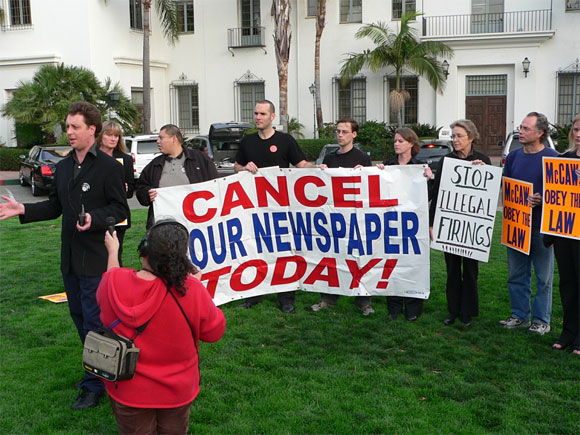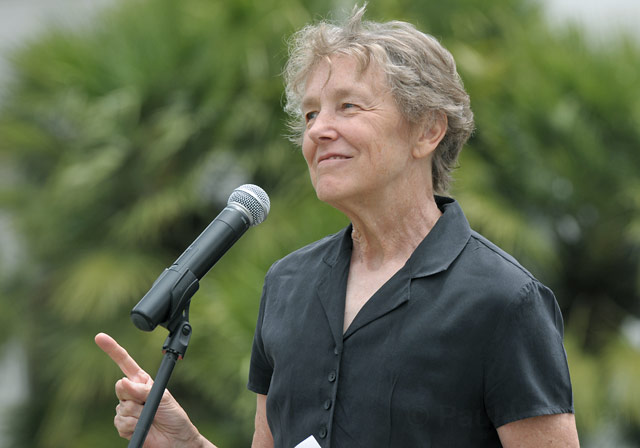Wendy’s Win
Three Arch-Conservative D.C. Justices Rule for McCaw

The times may be changing, but they’re not changing fast enough to curb some of the worst excesses at the Santa Barbara News-Press. Even as the country seeks to level the playing field for 99 percent of Americans, a federal appeals court today sided with Wendy McCaw, the multimillionaire owner and co-publisher of the News-Press, setting bad precedent and legitimizing – at least on paper – her fanatical campaign against the union in her newsroom.
Ignoring the facts on the ground, a panel of three arch-conservative judges in the Washington D.C. Circuit Court of Appeals invoked the First Amendment to rule that McCaw had every right to fire eight of us reporters in 2006 and 2007, on the heels of our vote to join the Teamsters, and that she could spy on and harass union supporters and cut their pay with impunity. In the judges’ distorted view, we newsroom employees formed a union and launched a boycott of the paper in order to control the news content of the paper, in violation of McCaw’s right to publish whatever she pleased.

Today’s bizarre and unfair ruling gives McCaw license to retaliate against her workers in ways that would ordinarily violate federal labor law. It spells bad news for media workers everywhere: It overturns a 2011 decision by the National Labor Relations Board ordering our immediate reinstatement and back pay, based on “serious and widespread” labor law violations. In 2007, an administrative law judge found the Santa Barbara News-Press to be guilty of “widespread, general disregard for the fundamental rights of the employees.”
No doubt today’s appeals court ruling will make publishers happy, but it will get little traction in Santa Barbara, where most people are familiar with the unsavory facts of the “News-Press Mess.” More than 17,000 readers have quit the paper since we were fired, and the boycott is ongoing. My former colleagues in the newsroom are still waiting for McCaw to start bargaining in good faith for a fair employment contract. We’ve filed two more cases against the News-Press; we’ve lost count of McCaw’s violations of labor law, there are so many.
The appeals court judges, no friends of working people, sided with McCaw’s outlandish claims that the labor board “fashioned itself a super-editor and second-guessed SBNP’s editorial decisions.” Yet anyone who’s ever read a newspaper knows that a phalanx of editors stands between reporters and the printed word. We can’t order the pressmen to do our bidding or control the content of the paper in any fashion. The very idea would be funny, except it’s not funny coming from some of the highest judges in the land. What really got them riled up was our public protest, in the form of our boycott campaign.
It’s been illegal in America since the 1930s for an employer – including, according to the U.S. Supreme Court, a newspaper employer – to retaliate against workers who form a union. Also, it’s illegal to retaliate if these same workers organize a boycott to put pressure on a recalcitrant boss to negotiate a contract. Yet – no surprise here – employers regularly flout the law. A 2009 Cornell University study for the Economic Policy Institute shows that fully one-third of U.S. employers fire union activists during union organizing campaigns. At the News-Press, one out of every four of us union supporters lost our jobs. Our newsroom voted 33-6 to join the Teamsters, and in all, nine of us have been fired, counting Dennis Moran, a member of our negotiating team who was fired in 2008 and is not involved in today’s ruling.
Two of us, John Zant and I, were senior writers who had been at the Santa Barbara News-Press for 38 and 21 years, respectively. All eight of us, including Anna Davison, Melissa Evans, Dawn Hobbs, Rob Kuznia, Barney McManigal, and Tom Schultz, helped the paper win many honors, including annual awards from the California Newspaper Publishers Association for general excellence. We were damn good at what we did. McCaw’s good at bullying. She hired nine law firms to make sure we never set foot in her building again.
It’s clear to us now that her strategy all along has been to kick the case up to the appeals courts, where she could expect a favorable decision from pro-business, activist judges, holdovers from more arrogant, less humane administrations. Here’s some background on the three who ruled in our case today:
Chief Judge David Sentelle, an appointee of former President Ronald Reagan, a Republican, joined in a 1990 ruling voiding the felony convictions of Oliver North and John Poindexter in the Iran-Contra scandal. During the tenure of President Bill Clinton, a Democrat, Sentelle picked Kenneth Starr as Special Prosecutor to press for the President’s impeachment.
Judge Stephen Williams, another Reagan appointee, cast the sole vote against affirming the constitutionality of Section 5 of the Voting Rights Act, the one that requires states with a history of suppressing minority votes to get judicial approval before changing voting procedures.
And in 2008, Judge Karen Henderson joined in a court ruling that tossed out the lawsuit of four Muslim former prisoners who alleged they had been tortured at Guantánamo. The court said they were “non-persons.”
These three judges bent over backwards to favor McCaw. But what, exactly, has McCaw won? Has she won back her credibility, her reputation, or her readers?
I remember how excited we were back in 2000 when McCaw bought the Santa Barbara News-Press from the New York Times. The day she took over, she threw a party on the third floor, and then, abruptly, the excitement ended for good. When we filed back into the newsroom that afternoon, we learned that McCaw had fired Publisher Allan Parsons, a truly gentle man; and suddenly everyone was crying. Several more publishers came and went, until, in the spring of 2006, McCaw announced that she would be co-publisher with her fiancé, Arthur Von Wiesenberger.
Spring had barely turned to summer that year when Editor Jerry Roberts and four other editors resigned, citing what they said was McCaw’s unethical interference in newsgathering and reporting. A dozen reporters quit, too, including one who had been covering a neighborhood dispute over the development plans of Rob Lowe, an actor friend of McCaw’s who wanted to build a mansion on a vacant lot in Montecito. Following standard newsroom practice, the reporter reported the address of the lot. Lowe’s assistant called the paper to complain, saying Lowe was going to cancel his subscription. McCaw fired off harsh letters of reprimand to the reporter and three editors, who all eventually resigned.
Those of us who chose to stay in the newsroom knew we needed a written contract to protect our job security and integrity as journalists from McCaw’s arbitrary attacks. We quickly signed cards to join the Teamsters, but McCaw refused to recognize the union. So, we held a union vote and won overwhelmingly. I was fired a month later, and seven others were fired not long after that. We were publicly urging subscribers to boycott the News-Press, a step we hoped would bring McCaw to the bargaining table for a fair employment contract.
Instead, that was the end of our daily newspaper careers in this town – the best job I ever had – and the beginning of McCaw’s reputation as one of the most blatantly anti-union employers in the state, if not the country. More than 70 journalists have left the News-Press staff since 2006, including some who took our place, and others who took theirs.
In a second case the union has filed, the National Labor Relations Board this year found McCaw guilty of bad-faith bargaining from Day One of negotiations and ordered her to pay all of the Teamsters’ negotiating costs, retroactive to 2007. Other violations of labor law in that case include firing Moran, discontinuing annual raises, hiring temporary employees to undermine the union, and ordering newsroom employees not to cooperate with federal investigators. McCaw has appealed this case to the D.C. court. In the meantime, the labor board is planning to prosecute a third case, alleging a number of repeat violations and some new ones.
Back in the 1990s, I covered stories about farmworkers in this county who worked for less than minimum wage for months on end. I wrote about strawberry pickers who staged walkouts over pay cuts and were fired on the spot. I was astonished by the glacial pace of justice in the courts for these workers and shocked that many of them never got their back pay. I never thought it could happen to me. Now, I’ve learned a bitter lesson in just how weak labor law is in America and how weakly it is enforced. I’ve witnessed how a wealthy boss can game the system, breaking the law on one hand and using the courts to delay and block justice on the other, smearing us on the pages of her paper, and subpoenaing our private e-mails, all of this serving to spread paranoia in our ranks.
Still, I have no regrets. Even as the appeals court rubs salt in our wounds, the community applies a healing balm. During the past six years, we have experienced what true solidarity is and what it can accomplish. I’m immensely grateful to my fellow Santa Barbarans and to the many, many other South Coast residents who have rallied to our cause, collecting donations for us, organizing rallies and forums to advance our cause, coming to our picket lines and candlelight vigils, speaking out publicly in our defense, and – this is the crucial thing – abandoning the paper by the thousands and never going back. Judges may come and go, but the community will endure.
I am thankful, too, for the extraordinary help of the Teamsters, who have spent more than half a million dollars in our defense, money they will never recoup in newsroom dues. They simply could not stand by in the face of injustice. Their members, complete strangers to us, took up collections around the country to help us survive. Without the union’s leadership and backing, we never could have sustained such a long and costly campaign for fairness at the News-Press. It continues to this day.
This fight is not over. It’s a different country now. Better men and women will someday replace the federal judges who protect the interests of the wealthy one percent of Americans. Meanwhile, the newsroom employees at my old paper deserve a fair contract, and the boycott continues in their support. Please don’t read, buy, or advertise in the Santa Barbara News-Press. Take a stand against McCaw’s war on workers. Let her know that might does not make right.
Pictured in the photo at the top of the story are, from left: Tom Schultz, Dawn Hobbs, Teamsters organizer George Perez, Barney McManigal, Rob Kuznia, Anna Davison, Melinda Burns, John Zant, and Melinda Evans.



